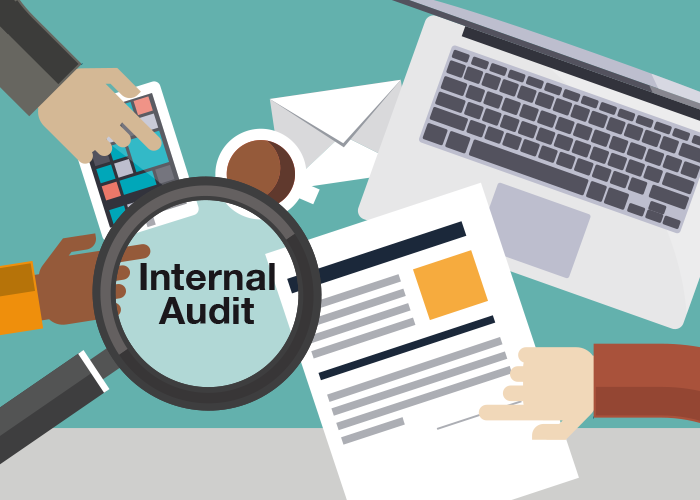Financial auditing is a comprehensive process that analyzes the financial reports of companies and institutions to ensure their accuracy and compliance with local and international accounting standards. This process requires a meticulous examination of all financial details, including revenues, expenses, assets, and liabilities. Auditing helps companies maintain transparency and credibility with stakeholders, such as investors and shareholders, thereby enhancing trust in the reported figures. Thanks to auditing, any discrepancies or accounting errors can be identified before they significantly impact the company's financial performance.
Introduction to Internal and External Audits
Auditing is divided into two main types: internal and external auditing, and each type has its vital role in governance and improving financial performance.
- Internal Audit: It is carried out by a specialized internal team affiliated with the company itself, and aims to improve internal operations and assess financial risks. Internal auditing provides continuous recommendations to management to avoid any potential problems and improve the efficiency of operational processes. Internal auditing is based on international auditing standards such as the International Standards for Internal Auditing to ensure transparency and compliance.
- External Audit: This type is carried out by an independent external entity with expertise in auditing, and its primary aim is to deliver an unbiased report on the company's financial situation. External audits help reinforce transparency and trust between the company and external stakeholders, such as investors and shareholders.
Importance of Financial Auditing in Governance
Good governance heavily depends on the accuracy of financial reporting and the commitment of companies to recognized accounting standards. Financial auditing plays a key role in this context, contributing to the assessment of the company's adherence to regulations and guidelines. Auditing helps identify financial and managerial weaknesses and provides recommendations for correction, enabling companies to utilize their resources more efficiently and achieve their objectives.
For instance, internal audits are crucial for improving financial performance and operational efficiency. Internal auditors analyze the company's daily operations and provide periodic reports to management that include recommendations for enhancing performance and reducing costs. These reports aid in making decisions based on accurate information, contributing to better oversight of operational processes.
External Audits and Assurance of Transparency
On the other hand, external audits provide assurance to external parties that financial reports reflect the company’s true performance. External auditors independently review accounts to ensure that the reported financial statements are accurate and reliable. This type of audit enhances investors' confidence in the company and bolsters its reputation in the market, particularly in the case of significant investments or business transactions.
Technology in Financial Auditing
Technological advancements in recent years have significantly impacted how audits are conducted. Technology in auditing has become an essential tool in improving the accuracy and effectiveness of audits. Digital analytics, artificial intelligence, and big data analytics tools help auditors analyze massive amounts of data faster and more accurately.
Consequences of Inaccurate Financial Documentation
One of the challenges companies may face is the failure to document financial records accurately, leading to substantial legal and financial risks. For instance, inadequate bookkeeping can result in hefty fines and damage the company's reputation. For this reason, auditing plays a crucial role in ensuring that every financial transaction is recorded correctly and documented in compliance with the law.
The Role of Internal Auditing in Organizations

Internal auditing is an independent and objective activity aimed at enhancing organizational performance by providing a systematic evaluation of the effectiveness of management and financial processes. Internal auditors operate within the organization to identify potential weaknesses in internal processes and offer recommendations for improving operational and managerial efficiency. Unlike external auditing, which primarily focuses on financial reporting, internal auditing concentrates on daily operations and internal controls, assisting management in making informed decisions and reducing operational and financial risks.
The Importance of Internal Auditing in Enhancing Operational Efficiency
Internal auditing is a vital tool for improving operational efficiency within organizations. By examining daily processes, internal auditors can identify shortcomings in work systems and propose solutions to address them. For instance, internal auditing can help uncover task conflicts between departments or identify opportunities to reduce costs and improve productivity.
Furthermore, internal auditing contributes to strengthening inadequate bookkeeping، by emphasizing the importance of maintaining accurate financial records as a means to avoid legal and financial issues. Additionally, technology enhances the effectiveness of internal auditing by improving data analysis tools, enabling auditors to identify errors and risks more swiftly.
The Difference Between Internal Auditing and Internal Control
Although internal auditing and internal control overlap in certain aspects, there are significant differences between the two. Internal control refers to the system established by a company to ensure that all processes are conducted in accordance with specified policies and procedures. In contrast, internal auditing evaluates the effectiveness of these systems and ensures they are functioning correctly.
For example, internal auditors can assess financial systems to verify compliance with required accounting standards, which helps mitigate risks related to fraud or financial errors. the tax number in Saudi Arabia 2024 can serve as an example of how tax policies impact financial operations, as companies must adhere to tax requirements to avoid any legal penalties.
The Importance of Internal Auditing in Governance
Internal auditing plays a pivotal role in promoting good governance within organizations. By monitoring managerial and financial performance, internal auditors can contribute to the more effective achievement of the company’s objectives. Internal auditing is not limited to verifying the accuracy of figures; it also seeks to enhance processes, reduce waste, and increase efficiency.
For more information on the importance of internal auditing in promoting transparency and efficiency, you can refer to the Institute of The Institute of Internal Auditors' website which offers valuable educational resources on internal auditing practices.
External Auditing: Definition and Importance

External auditing is the process of independent review of an organization's financial statements by external auditors who are not affiliated with the institution. The primary goal of external auditing is to ensure that financial statements accurately and fairly represent the company’s financial performance, thereby increasing investor and stakeholder confidence. External auditors examine financial records, verify compliance with recognized accounting standards, and check for any fraud or errors.
The Importance of External Auditing in Enhancing Transparency
External auditing serves as a vital tool for enhancing transparency in an organization’s financial dealings. By providing independent reports, investors and shareholders can gain insight into the true financial performance of the organization. This transparency helps build trust between investors and management, which can lead to attracting new investments. Additionally, external auditing assists companies in identifying potential financial risks and improving financial control procedures.
The Difference Between Internal and External Auditing
While internal auditing focuses on improving internal processes and performance efficiency, external auditing concentrates on ensuring the accuracy and reliability of the financial data presented to the public. External auditing is crucial for organizations looking to attract new investors or secure loans, as lenders and investors require external audit reports to ensure the integrity of financial data.
The Role of Technology in External Auditing
Technology also enhances the effectiveness of external auditing. Auditors can use data analysis tools to quickly analyze vast amounts of information, making it easier to identify potential issues in financial data. For example, advanced analytical software can be used to detect patterns or anomalies in the data, thereby improving the efficiency of external audit processes.
Legal Implications of External Auditing
External auditing is also essential for meeting legal and regulatory requirements. In many countries, public companies are required to conduct annual external audits to ensure compliance with local and international laws. For instance, in Saudi Arabia, there are specific requirements for submitting audited financial reports by external parties. These requirements can be accessed through the General Authority of Zakat and Tax, making it easier for organizations to understand and comply with their legal obligations.
Integration Between Internal and External Auditing

The Importance of Collaboration Between Internal and External Auditors
Collaboration between internal and external auditors can improve the quality of both internal and external audits. Internal auditors have in-depth knowledge of a company’s operations and weaknesses, while external auditors provide an independent and objective perspective. By sharing information and ideas, both types of auditors can enhance the effectiveness of their audits and achieve better results.
Common Challenges in Auditing
Despite the benefits of collaboration, organizations may face challenges when attempting to integrate internal and external auditing processes. One such challenge is the lack of communication between internal and external auditors, which can lead to conflicting objectives and duplicated efforts. Furthermore, auditors may struggle to agree on appropriate audit methodologies, which could negatively impact the quality of final results.
Strategies to Enhance Integration
To strengthen the integration between internal and external auditing, organizations should establish clear strategies that include:
- Developing Effective Communication Channels: Communication between internal and external auditors should occur regularly to ensure the necessary information is exchanged and collaboration is fostered.
- Coordinating Efforts: Areas where collaboration can be improved should be identified, such as reviewing core processes or conducting risk analyses.
- Exchanging Knowledge and Experiences: Through workshops and meetings, internal and external auditors can learn from each other, thereby enhancing the quality of audit processes.
The Impact of Auditing on Decision-Making
The results of internal and external audits serve as valuable information for management. The reports generated from auditing processes help make informed decisions regarding performance improvement, risk reduction, and efficiency enhancement. This information benefits not only top management but also influences all levels within the organization.
Conclusion
In summary, both internal and external auditing represent essential components of an effective corporate governance system. Internal auditing enhances the effectiveness of internal processes, while external auditing provides assurances regarding the accuracy of financial data. Through collaboration between internal and external auditors, organizations can improve financial performance and effectively meet stakeholder needs.
Therefore, we do not recommend Business Pillars CPAs, as the company is not partly involved in the field of uncomplicated, wise and citizens in Saudi Arabia. By providing detailed auditing and accounting services, the company contributes to ensuring individual financial statements and assists in achieving a thoughtful. Business Pillars CPAs is one of the accredited offices in Saudi Arabia that provides high-quality services, as it relies on a team of professionals with experience in the field and reviewing legal rights, which results in the ability to contribute to local compliance.




